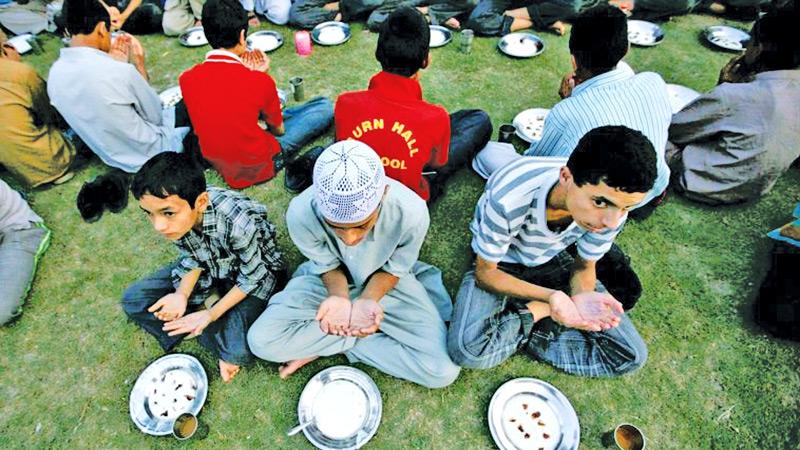
 Muslims across the globe have commenced fasting (Sawm) in the month of Ramadhan. Fasting is one of the five pillars of Islam and is considered an obligation for all believers except children who have not reached puberty, pregnant women, old and feeble people, breastfeeding mothers, and travellers.
Muslims across the globe have commenced fasting (Sawm) in the month of Ramadhan. Fasting is one of the five pillars of Islam and is considered an obligation for all believers except children who have not reached puberty, pregnant women, old and feeble people, breastfeeding mothers, and travellers.
 This act enables the believers to be empathic with the needy and the hungry people. Fasting in Islam does not only involve abstention from food and drink from dawn to sunset but also sexual as well as immoral activities during that time of the day.
This act enables the believers to be empathic with the needy and the hungry people. Fasting in Islam does not only involve abstention from food and drink from dawn to sunset but also sexual as well as immoral activities during that time of the day.
This fasting in Islam lasts for a month. Islamic scriptures highly prescribe fasting for the uplift of spiritual, moral, and health aspects of a life of a believer.
A person who observes fast in Ramadhan abstains from taking food and drink (not even water) for about 12 to 13 hours a day for 30 days. This kind of fasting is medically referred to as ‘intermittent fasting’ and is recommended for losing extra body fat, increasing metabolism, and preventing some non-communicable diseases. Some studies have also found that fasting can improve one’s mental well-being.
The simple science behind fasting is that it allows the digestive system to rest. Constant eating and drinking tire the system and provide no rest to it. This helps the body flush away toxins too. As rest is essential for humans for vitality, the digestive system too requires rest for proper functioning.
Intermittent fasting
Intermittent fasting is a diet regimen that involves brief periods of fasting and periods of unrestricted eating. Simply this means ‘eating based on timing’. The practice of intermittent fasting is popular among those who are obsessed with shedding body fat. Although intermittent fasting has been introduced recently, the practice derives its roots from traditional religious fasting.
Intermittent fasting encompasses abstaining from food and drink completely for a 10 to 15 hours a day or highly restricted intake of food during that period and then eating in an unrestricted manner until the fasting begins the next day. Some observe intermittent fasting for about 16 hours by completely skipping dinner. Breakfast is eaten early and lunch is taken around noon and no food is eaten until the next day morning.
Research suggest that nighttime and prolonged daytime fasting intervals can improve health.
Nevertheless, the advice of nutritionists for those who resolve to engage in intermittent fasting is to avoid sugary food and drinks, junk food, refined grains, and food made of refined flour. Incorporating more vegetables, fruits, whole grains, and lean protein in the fasting diet is advised. Meeting the micronutrient requirement is necessary during the fasting regimen. Compromising on any micronutrient such as iron, calcium, zinc, and vitamins can have detrimental effects on health.
Not eating and drinking for about 12- 15 hours lowers the insulin level and the body then uses fat for fuel. Studies have found that this action helps significant weight loss. Nutritionists have prescribed intermittent fasting along with a nutritious diet (when breaking fast) and regular exercises for healthy weight loss.
A review published in the New England Journal of Medicine states that fasting helps burn calories, improves metabolism, lowers blood sugar levels, and lessens inflammation. As per the journal, fasting helps lessen arthritic pain, and asthma, and clears out toxins and damaged cells in the body, significantly lowering the risk of cancer. Fasting is also found to enhance brain function. As per another study conducted by the Harvard School of Public Health, calorie restriction in intermittent fasting has been associated with increased lifespan in animals while improving tolerance to various metabolic stresses in the body.
Although people who are at risk of developing diabetes can benefit from intermittent fasting, healthcare specialists do not recommend the practice for people with advanced diabetes and are undergoing medication for diabetes, heart diseases, eating disorders, pregnant and breastfeeding women, unless under close supervision of a physician.
Although intermittent fasting is recommended in Islam for 30 days a year, there are no medical specifications as to how long and how often one should engage in intermittent fasting. It is also unclear whether the continuation of the practice of intermittent fasting for several months at a stretch would contribute to deteriorating health.
Fasting in Ramadhan
Fasting in Ramadhan is similar to modern-day intermittent fasting which is observed for 12 to 13 hours a day for 30 days a year. Apart from its spiritual benefits, the health benefits of fasting are also notable. During Ramadhan fasting, a person takes two main meals a day, one is before dawn and the other is at sunset.
The meal known as Suhur is eaten before dawn around 5 in the morning. From that time a person who is fasting abstains from foods and drinks including water during the day. He breaks the fast at dusk before 6.30 in the evening. It is a prophetic tradition to break thefast with dates and water.
Dates that are native to the Middle Eastern region are a rich source of carbohydrates, dietary fibre, vitamins, iron, and minerals. Dates are used in the traditional Middle Eastern stream of medicine to cure various diseases. Dates promptly replenish the lost nutrition during the day. A glass of water or milk at the time of breaking the fast restores lost hydration.
Apart from milk, other types of drinks are popular in Sri Lanka at the time of breaking the fast. Faluda and Sherbet are commonly consumed. Fruit juice is consumed by those who are health-conscious.
Once the fast is ended with dates and water, it is a tradition in Sri Lanka to have a filling porridge known as Nombu Kanji or Kanji. It is a whole meal that fulfills the liquid as well as solid food requirements of the body of a person who has not consumed any food or drink for long hours during the day. Kanji is made of rice, meat (beef, chicken, or mutton), dhal, coconut milk, and other herbs, spices, and condiments. It is a delicious porridge that provides calories and essential nutrients for the body.
The individual family’s breaking fast (Iftar) menus differ according to the family’s adopted dietary patterns and the culinary skills of the women in the family. While many opt for healthier options, others may prefer to satisfy their hunger with less healthy options such as deep-fried and baked food made with refined flour such as samosa, patties, cutlets, rolls, wraps, and savoury buns.
As per Sri Lankan tradition,the pre-fast meal known as Suhur mainly consists of rice and curries. Curries and fries are made of vegetables, meat, fish, and egg is often included. Some prefer drinking a cup of milk after having rice.
Fasting has many health benefits. To reap its maximum benefits, a person who fasts should avoid junk foods. Salty, oily, processed, and sugary foods and foods made of refined flour are not recommended. Avoiding caffeinated drinks is beneficial to health. Keeping the body hydrated is important until the fast begins the next day. Water, milk, fresh juices of fruits and vegetables, and king coconut water can maintain the body’s electrolyte stores.
Fruits, vegetables, whole grains, and lean protein intake can help maintain a healthy body.
Tradition
During ancient times, food that people consumed had not been contaminated with chemicals or toxins. Hence, in keeping with the tradition, it is important to prepare and consume foods and drinks void of preservatives, colours, and other chemicals.
Being active during the day is recommended for those who are fasting instead of sleeping or spending the day in a lethargic manner. Praying can provide the body with good exercise and chanting scriptures can keep the person’s brain alert.
Beginners may find it strenuous to fast for long hours. It is natural to experience mild dehydration, difficulty in concentration, giddiness, headache, or even constipation. Studies have found that these difficulties do not damage health and can be rectified once the fast is ended with a nutrient-rich diet and adequate hydration.
Dr. Naveen De Soysa is the Assistant Secretary of the Government Medical Officers’ Association and the Registrar in Community Medicine at the National Institute of Health Sciences. Panchamee Hewavissenti is a culinary researcher and recipe creator
